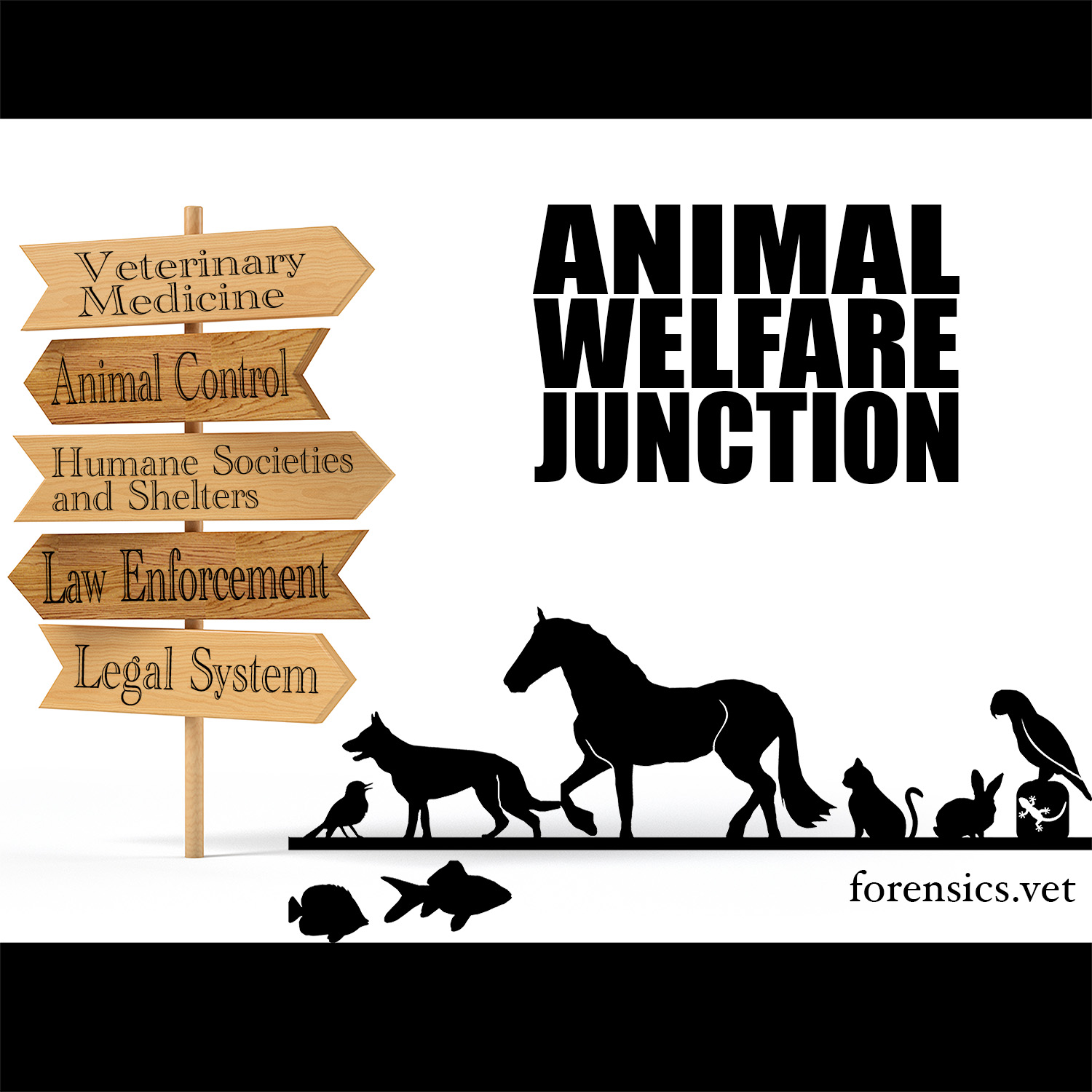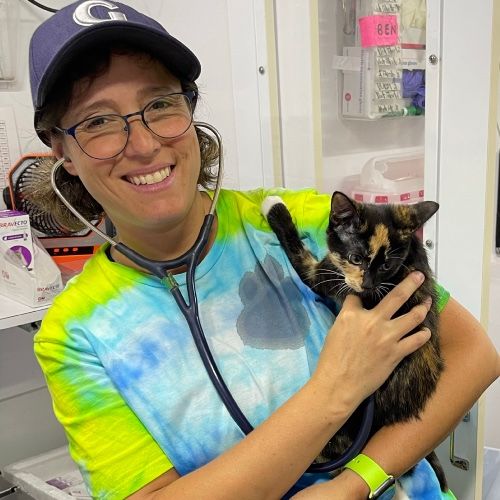Animal ForensiCon 2025: Animal Hoarding with Becky Morrow, DVM
Dr. Becky Morrow, founder of Frankie’s Friends, gives us an overview of the role of the veterinarian in forensic cases including testifying in court.
The 2025 Animal ForensiCon: The Animal Forensic Investigations Conference is a three-day event, offered in Daytona Beach Shores, Florida from May 7th to 9th, 2025. The conference is hosted by the University of Florida’s Veterinary Forensic Sciences Laboratory.
ForensiCon offers workshops and educational sessions on a wide variety of topics pertaining to criminal investigations, law, small animal investigations, equine and livestock investigations, and wildlife crimes. This conference is open to anyone interested in animal forensic investigations. Attendees will also have the opportunity to network with faculty, experts, and investigators
Transcript
The first presentation on this day three of the ForensiCon is a
2
:friend of mine that I admire so much.
3
:Becky Morrow, thank you for being here.
4
:Becky Morrow: Oh my gosh.
5
:Thank you so much.
6
:You're also someone I admire very much.
7
:DrG: Let's start by letting the
audience know who you are, like
8
:where you come from and what you do.
9
:Becky Morrow: Cool.
10
:Yes.
11
:Um, so I'm actually from Pittsburgh,
Pennsylvania, and I started out
12
:not being a shelter vet 'cause that
wasn't a thing back in vet school.
13
:Uh, found my path there through
the case that I was talking about
14
:today in my hoarding presentation.
15
:And, uh, got some more training in
that through the University of Florida.
16
:Got my master's degree and I started
a nonprofit about 15 years ago.
17
:We do high quality,
high volume spay neuter.
18
:We do forensics.
19
:We do some humane research studying
infectious diseases in cats, and
20
:we have a medical cat rescue.
21
:It's called Frankie's Friends Humane.
22
:DrG: Excellent.
23
:I mean, we're like sister nerds, right?
24
:Becky Morrow: Like absolutely.
25
:DrG: We do a lot of the same stuff
and we like to teach students, which
26
:is also so important for the future
of veterinary medicine, shelter,
27
:medicine, and forensics in general.
28
:Becky Morrow: Absolutely.
29
:DrG: Your presentation today was about
animal hoarding and the veterinarian's
30
:perspective on animal hoarding.
31
:So what can you tell us about the
importance of the veterinarian
32
:in identifying and handling
a case of animal hoarding?
33
:Becky Morrow: Right.
34
:I, I think this is.
35
:A really complicated case that law
enforcement, uh, when we have police
36
:officers and those that are involved
in, in, in criminal cases, they're
37
:almost always humans as victims
and animal victims are new to them.
38
:Even those that are used to doing animal
cruelty cases, hoarding cases are a
39
:whole nother ball game because you
have multiple animals, many different
40
:species in the same building perhaps.
41
:And this is gonna make it a,
a situation where you have to
42
:have a lot of organization.
43
:You have to have a team, you have to
have a purpose and common plan, a plan
44
:that's known to everybody and execute it.
45
:Uh, it, it's just really one of those
topics that we wanna share what we've
46
:learned and learn from others so we can
all do a little bit of a better job.
47
:DrG: Yeah.
48
:I think one of the important parts
is like, kind of how you mentioned
49
:there are human victims and there are
animal victims, and oftentimes the
50
:human victim is the hoarder itself,
and they're seen as just a perpetrator.
51
:And yes, we need to hold them responsible,
but we also need to educate 'em and
52
:work with them to make them better.
53
:And then on the other side the
officers and people that are working
54
:with it do not really understand
how to handle an animal problem.
55
:Right.
56
:Like a high volume animal problem.
57
:Becky Morrow: Right.
58
:It's, it's a very di
different, unique situation.
59
:I mean, in law enforcement, again, there's
no, uh, really example in humans, right.
60
:That they would have to deal with.
61
:It's, it's, it's very different.
62
:And I think that the other thing
is just to make people realize
63
:that this is a horrible type
of cruelty and it's not always
64
:thought of as, as that.
65
:It's sometimes just played off flippantly
as, oh, they just got overwhelmed.
66
:They meant well, and, you know, it's,
it's like not a big deal, but it truly is.
67
:This is some of the worst
suffering that we could see.
68
:And we do need to hold people accountable.
69
:And it may not be, we're not
trying to send the, the little
70
:lady to jail or anything like that.
71
:But we need to prevent that from
happening again in the future.
72
:DrG: What is your advice for
veterinarians that wanna get involved?
73
:Going into like their
first animal hoarding case?
74
:Things for them to look for,
things for them to note to report.
75
:Right.
76
:Becky Morrow: That's,
that's a great question.
77
:I mean, I, it's, it's a lot of us
learning as we, we see things, but there
78
:are some great resources now out there.
79
:The animal forensic books are great.
80
:They definitely do give you a, some
background on it, so there's resources.
81
:There's different
webinars and so forth now.
82
:So just kind of getting an idea.
83
:If you can't contact somebody
specifically and talk to a forensic
84
:vet who does this, there's definitely
resources to help you with.
85
:But a lot of it's the same problem
solving skills that we have, right?
86
:We're already into this, this
problem solving aspect of our career.
87
:It's just solving different
problems, and in this case, it's
88
:not just treating the patient,
you're actually collecting evidence.
89
:So you have to go in with a
little bit of a different mindset.
90
:DrG: One of the things that I discuss
with the attorneys that have given
91
:presentations is about the reluctancy
of veterinarians in testifying.
92
:And I know that you like to testify.
93
:I love to testify, but not
everybody's built like us, right?
94
:Right.
95
:What?
96
:But it's not that big a deal, and I
think it's about veterinarians knowing
97
:what they know and what they don't know.
98
:So what would be your advice for a
veterinarian that wants to get involved
99
:and is just worried about the, the
jury or the, the legal side of it?
100
:Becky Morrow: Right.
101
:No, that's, that's really,
it is truly a thing.
102
:I mean, 'cause you just don't know.
103
:It's scary, it's unexpected.
104
:Not something we're trained
to do, but absolutely.
105
:You are the expert as a
veterinarian, you know a lot more
106
:than anybody else in that room.
107
:And using your knowledge and
using your same skills that
108
:you do for diagnosing animals.
109
:You're essentially, um, you're teaching
the jury, you're teaching the, the judge.
110
:That's something you do
to with clients already.
111
:So it's really a natural I think
transition, other than the fact that it,
112
:it is scary at first when you get up on
the stand because, you know, this is a
113
:procedural different, different things.
114
:You're, you know, having to swear to,
to an oath and it's scary at first, but
115
:it's really, uh, rewarding that you're
there telling the story of that victim
116
:and you were just there for the truth.
117
:You're not there for any side.
118
:You just speak the truth and that's what
you do every day when you talk to clients.
119
:So I think it's really
natural for us to do that.
120
:DrG: Yeah, that's a great advice because
a lot of people think about, well,
121
:the defense is gonna be grilling me.
122
:Like how many times in general
practice do we get grilled by owners
123
:that think that they know everything?
124
:You go say, research Google.
125
:Becky Morrow: Yes,
126
:DrG: Dr.
127
:Google.
128
:And they come in and they're like,
no, you don't know what you're doing.
129
:And you have to prove yourself.
130
:Right?
131
:You have to prove your competency.
132
:So I mean, it's not that much
different than being with client.
133
:There's just other people in there.
134
:Becky Morrow: Right.
135
:And preparation just like anything else.
136
:And, you know way more you're
smarter than they are no matter what,
137
:because you are the veterinarian.
138
:That is your field of expertise.
139
:That is not theirs.
140
:DrG: Excellent.
141
:Well, thank you so much for being here.
142
:Thank you for everything that you do.
143
:Becky Morrow: Thank you for what you do.

